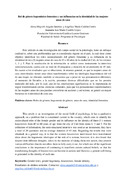Rol de género hegemónico femenino y sus influencias en la identidad de las mujeres amas de casa
Resumen
Este artículo es una investigación del campo social de la psicología, tiene un enfoque cualitativo, sobre una problemática que es considerada vigente en el país, la cual tiene como objetivo identificar los roles socioculturales del género femenino y su influencia en la identidad de tres (3) mujeres amas de casa de 45 a 60 años de la ciudad de Cali, de los estratos 1, 3 y 5. Para la recolección de la información se utilizó como instrumento la entrevista semiestructurada, cuenta con un total de 20 preguntas y duración de un promedio de 45 min. En cuanto a los resultados que se obtuvieron, de manera general, es que la mujeres amas de casa entrevistadas tienen unas ideas transformadas sobre las ideologías hegemónicas del rol de una mujer, no obstante, también se encuentra que a pesar de sus pensamientos diferentes, al momento de llevarlos a la acción, presentan diversas dificultades que no les permite realizarlo del todo, por lo cual, una de las conclusiones significativas es la importancia de seguir transformando ciertas creencias culturales, para que los pensamientos transformadores de las mujeres amas de casa puedan convertirse en acciones y así mismo, se genere un mayor bienestar en la identidad de cada una.
Abstract
This article is an investigation of the social field of psychology, it has a qualitative approach, on a problem that is considered current in the country, which aims to identify the sociocultural roles of the female gender and its influence on the identity of three (3 ) women housewives from 45 to 60 years of age from the city of Cali from strata 1, 3 and 5. For the collection of information, the semi-structured interview was used as an instrument, they have a total of 20 questions and an average duration of 45 min. Regarding the results that were obtained, in a general way, it is that the women housewives interviewed have transformed ideas about the hegemonic ideologies of the role of a woman, however, it is also found that despite their different thoughts, when At the moment of taking them into action, they present various difficulties that do not allow them to fully carry it out, for which one of the significant conclusions is the importance of continuing to transform certain cultural beliefs, so that the transforming thoughts of housewives can become in actions and likewise, a greater well-being is generated in the identity of each one.
Colecciones
- Psicología [203]

